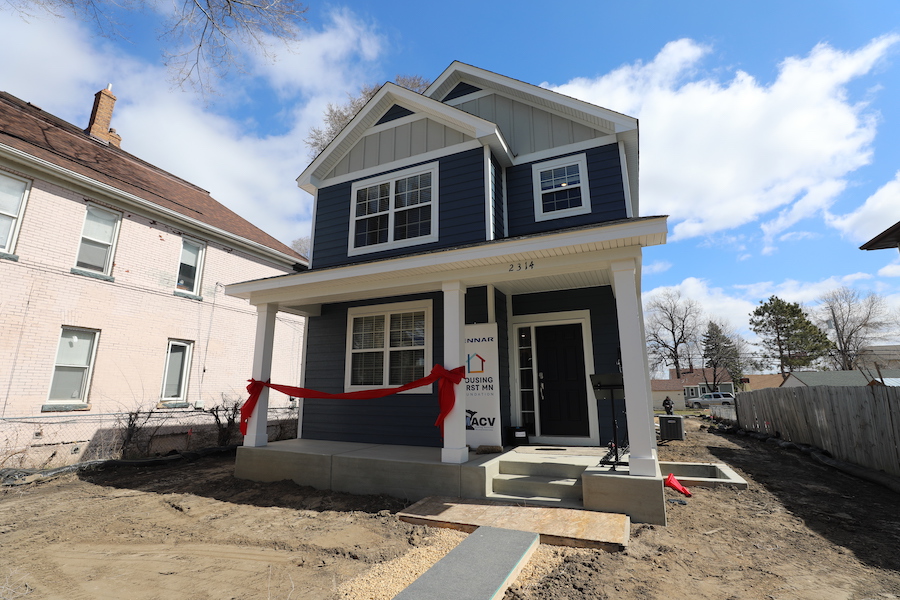New North Minneapolis home to help veterans transition out of homelessness
On Wednesday, March 31, the Housing First Minnesota Foundation/HomeAid Twin Cities along with build partner Lennar formally handed over the keys of a brand new 4-bedroom home in North Minneapolis to the Minnesota Assistance Council for Veterans (MACV). The new home will help to end veteran homelessness, a population of the community that is in growing need of services.
What was a vacant community garden is now a beautiful residence that is a fully furnished two-story, 4-bedroom, 3.5-bathroom, 2,232-square-foot transitional house constructed for individual veterans and veteran families who have experienced a hardship and are financially struggling to secure housing.
Our Housing for Heroes community projects provide a safety net for veterans which allows them the space and resources to recenter their lives,” said Donnie Brown, Housing First Minnesota Foundation Director. “Veteran residents will have everything they need to live on their own and have access to services to support both physical and emotional health to begin their healing process.”
This is the fifth home built by the Housing First Minnesota Foundation and build partner Lennar for veterans experiencing homelessness. Lennar and their generous trade partners donated labor and materials for this four-bedroom residence.
“It has been our honor to work on these Housing for Heroes projects with the Housing First Minnesota Foundation and MACV,” said Bill Burgess, division president of Lennar Minnesota. “We’re fortunate to have trade partners and associates who are so willing to give back to our veterans who have sacrificed so much.”
While in the home, residents will work with MACV case managers to overcome their housing, employment and legal barriers. This critical program gives homeless veterans the support and confidence to once again find success. The new veteran residents will move into the home in the coming weeks.
“MACV is excited that we are bringing this amazing partnership to North Minneapolis and we are ready to build new partnerships in this space,” said Jon Lovald, chief operating officer of Minnesota Assistance Council for Veterans. “This home will provide veterans a place to call home for years to come and serves as a symbol to all those who pass by the house to see what can be accomplish when you work together to end veteran homelessness in Minnesota.”
Since 2017, the Housing First Minnesota Foundation has built over 14,375 square feet of transitional housing for veterans and has added 18 shelter beds to serve over 41 individuals.
BACKGROUND:
Housing First Minnesota Foundation/HomeAid Twin Cities: Housing First Minnesota Foundation/HomeAid Twin Cities is building futures through housing for Minnesotans. We partner with service organizations to build and renovate existing transitional housing facilities and offer scholarships to individuals entering the construction industry. We leverage the expertise and resources of Housing First Minnesota’s member builders, remodelers, and associates to build new lives through housing. This collaborative project is supported by Wells Fargo, Lakes Area Realty, Movement Mortgage patronage, Karis AMC’s Foundation, and our many trade partners. EIN# 41-1802616.
Lennar: Lennar is the largest homebuilder in the Twin Cities with homes for sale in over 100 communities. Lennar and the Housing First Minnesota Foundation have partnered to build four new homes for MACV that house homeless veterans in the Twin Cities.
Minnesota Assistance Council for Veterans: MACV is a 501(c)(3) nonprofit organization that has provided critical intervention assistance to homeless veterans and their families since 1990. When immediate independent housing is not an option for veterans MACV offers 57 units of transitional housing in multiple Minnesota communities. Veterans may reside in the community-based housing for up to two years, although many veterans move to independent housing sooner.

